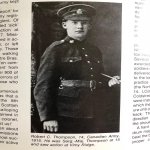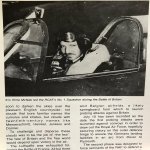You are using an out of date browser. It may not display this or other websites correctly.
You should upgrade or use an alternative browser.
You should upgrade or use an alternative browser.
Picture of the day
- Thread starter jwhc
- Start date
Note the sailors w/o ear protection. Presumably they all went on to suffer profound hearing loss.
The B-25 is one noisy aircraft. Each cylinder is individually vented and the noise is immense. I've flown on both a B-25 and a B-17. The B-17 with 4 engines seemed a lot quieter than the B-25 with 2 engines. The B-17 has an exhaust collector ring on the engines which seems to make quite a difference.
In a copy of the "American Rifleman" dated Dec. 1949, there is an article entitled "Food For Thought" about the effects of engine noise on aircrew during long flights. It was thought to have an effect on the ability to think and act quickly and impair concentration to the job to hand.
They enlisted the support of Naval ROTC cadets enrolled at Harvard and active target shooters from the Harvard Employees Rifle Team. Amplifiers that put out the noise level of radial engines were installed and shooters were required to shoot groups in six strings (100-120 shots) from the off hand position. A total of 85 scores were fired during the test.
To everyone's surprise, the average of scores increased during the test! Noise levels were 100-110 decibels, enough to cause shooters to feel their diaphragms vibrate in their chests! All this without ear protection of any kind.
Immediately following the tests, scores returned to their previous levels. There was no comment about damage to the hearing of the shooters.
Yurts can be quite comfortable.
My brother spent some time in Mongolia and quite enjoyed it.


The Nicola ranch near Merritt has yurts for their guests. Apparently quite popular.
Donny Fenn1
CGN Ultra frequent flyer
- Location
- East Kootenays
The Nicola ranch near Merritt has yurts for their guests. Apparently quite popular.
Fernie RV Park as well. Plus there are a few at various skis hills in the Rockies.
I had Veterans who had fought in North America in my regiment.
On Remembrance Day, we even saw Veterans from the Boer War on parade.
How is that possible? There are no living CDN WW1 vets left, how would a Boer War vet be living?
I had Veterans who had fought in North America in my regiment.
On Remembrance Day, we even saw Veterans from the Boer War on parade.
One of our neighbors was a Boer war vet. He used to say, "there was ni war like the Boer War". At some point during the Doukhobor troubles he did duty guarding Peter Veregin's tomb. He pulled thru the war only to be killed by a bull late in life.

George Frederick Ives (17 November 1881 – 12 April 1993) was a British army veteran, who became known as the last surviving veteran of the Boer Wars. George Ives became known in the UK after a piece in the Peterborough Column in the Daily Telegraph (UK). His record as oldest British veteran, at 111 years and 146 days, of any war was broken on 1 November 2007 by First World War veteran Henry Allingham. Also, at the time of his death, he was the oldest living man in Canada.
Biography
Ives was born at Brighton, England. The family worked for the Tidmarsh family. He worked in his father's workshop in Bristol until 1899.[1] That December, Ives was eager to enlist after hearing that the British had been defeated at Colenso, Magersfontein.[1]
In the Boer War, George fought with the Imperial Yeomanry, along with 122 other veterans, of the British Army in South Africa.[1]
Ives emigrated to Canada in 1903 with his father and purchased 160 acres (0.65 km2) of land for ten dollars. He was rejected from service in World War I because of a heart murmur.[1]
In 1910, he married Kay Nelson. The couple had three sons and three daughters. Nelson disliked the hard life of the prairies, so the family moved in 1919 to White Rock, British Columbia. Ives owned a farm there and eventually retired from it in 1941. He looked and found another job because he said that his retirement was an excuse to change jobs. So until 1956, 15 years later, he worked in a shipyard building wooden scows, and confirmed his retirement.[1]
The couple had resided in that same house until 1984, until moving into a retirement home. He attended the Albert Hall service on Remembrance day 1992 in England and met Queen Elizabeth and her mother; Baroness Margaret Thatcher, and Prime Minister John Major. Ives died on 12 April 1993 at aged 111 years, 146 days in British Columbia, Canada.[1]
My grandfather served in the Boer War with the British Army and also in WW1. He never said so much as one word to me about either experience.
Here he is, trying on a new hat, getting ready to meet the Queen.

And here is his original hat. I don't know if it is Boer war or WW1.

And his 1914 Christmas cake tin.

My strongest memory of him was him scrounging me a brick of DND 22 ammo at Connaught range in about 1955. I had never seen, never mind had a brick of ammo before.
Here he is, trying on a new hat, getting ready to meet the Queen.

And here is his original hat. I don't know if it is Boer war or WW1.

And his 1914 Christmas cake tin.

My strongest memory of him was him scrounging me a brick of DND 22 ammo at Connaught range in about 1955. I had never seen, never mind had a brick of ammo before.
fat tony
CGN Ultra frequent flyer
He also strangled one of his guards to death and escaped & returned for more fun. He was again imprisoned, surviving the war. He gave evidence in war crimes trials which allegedly resulted in 22 war criminals being hanged. I would hire him.
As the famous spy codenamed 'The White Rabbit', Forest Frederic Edward Yeo-Thomas spent the Second World War behind enemy lines and was captured and tortured by the Nazis.
Last edited:
fat tony
CGN Ultra frequent flyer
How is that possible? There are no living CDN WW1 vets left, how would a Boer War vet be living?
Aleutian campaign. Not all Cgners are twenty something
Last edited:
Some of us are fairly long in the tooth and are still giving it. I knew a lot of WW1 Vets as a kid and remember some of them working as Commisionaires on military bases untill 1970 of so. That's 52 yrs after WW1. To keep things in perspective I served from 1964 and am still doing part time work today. You're only as old as you think you are, and when you grow up, you die.
To keep things in perspective I served from 1964 and am still doing part time work today. You're only as old as you think you are, and when you grow up, you die.
Time flies. When I joined the Army a lot of the officers and NCOs were WW2 vets. I learned a lot from them.
Time flies. When I joined the Army a lot of the officers and NCOs were WW2 vets. I learned a lot from them.











































































